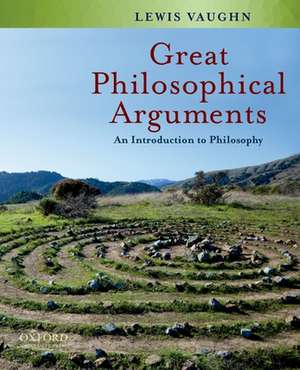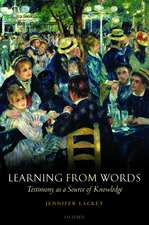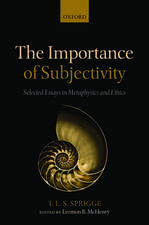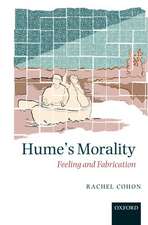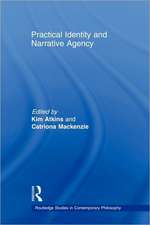Great Philosophical Arguments: An Introduction to Philosophy
Autor Lewis Vaughnen Limba Engleză Paperback – 2 noi 2011
* Essay questions at the end of each argument section and chapter
* Pedagogical features including boldfaced key terms, biographical text boxes, suggestions for further reading, and a glossary
* An appendix on how to read and write argumentative essays
* An Instructor's Manual and Test Bank on CD featuring chapter summaries, reading summaries, PowerPoint-based lecture outlines, and test questions
* A Companion Website at www.oup.com/us/vaughn containing study questions, interactive quizzes, flashcards, and helpful links
Preț: 844.06 lei
Preț vechi: 1156.25 lei
-27% Nou
Puncte Express: 1266
Preț estimativ în valută:
161.53€ • 168.02$ • 133.35£
161.53€ • 168.02$ • 133.35£
Carte tipărită la comandă
Livrare economică 15-29 aprilie
Preluare comenzi: 021 569.72.76
Specificații
ISBN-13: 9780195342604
ISBN-10: 0195342607
Pagini: 688
Dimensiuni: 191 x 234 x 26 mm
Greutate: 1.04 kg
Editura: Oxford University Press
Colecția OUP USA
Locul publicării:New York, United States
ISBN-10: 0195342607
Pagini: 688
Dimensiuni: 191 x 234 x 26 mm
Greutate: 1.04 kg
Editura: Oxford University Press
Colecția OUP USA
Locul publicării:New York, United States
Descriere
Great
Philosophical
Arguments
is
based
on
the
fact
that
much
of
the
power,
drama,
and
pleasure
of
philosophy
comes
from
argument—specifically
from
the
many
touchstone
arguments
that
generated
much
of
the
philosophical
canon.
Like
other
topically
organized
introductory
philosophy
readers,
this
book
is
organized
around
the
main
areas
of
philosophy:
the
existence
of
God,
knowledge
and
skepticism,
mind
and
body,
free
will
and
determinism,
ethics,
and
contemporary
ethical
debates,
includingabortion,
euthanasia,
and
global
hunger
and
poverty.
But
what
is
unique
is
the
systematic
focus
on
argument.The
reading
selections
are
organized
by
argument.
Each
argument
is
introduced
by
a
briefing
that
(1)
sketches
the
argument,
(2)
provides
conceptual
background
for
it,
and
(3)
reviews
some
of
the
main
philosophical
responses
to
it.
After
the
briefing
come
two
to
four
selections
presenting
the
classic
statement
of
the
argument,
critiques
and
defenses
of
it,
and
discussions
of
related
debates.
At
the
end
of
each
agrument
are
useful
essay
questions
for
further
analysis.
Vaughn's
approach
focusesstudents'
attention
on
argumentation,
where
much
of
the
philosophical
work
gets
done;
it
gives
them
clear
points
of
reference
for
navigating
material
in
which
they
often
get
lost;
and
it
helps
them
understand
and
appreciate
the
philosophical
dialectic-the
interplay
of
argument
and
counterargument
amongarticles
and
authors.An
introductory
Chapter
One
explains
the
concerns
and
methods
of
philosophy,
explains
its
practical
and
theoretical
benefits,
and
provides
a
short
lesson
in
identifying,
constructing,
and
assessing
arguments.
Each
chapter
has
an
extensive
introduction
to
the
issue
and
arguments,
and
essay
questions
at
chapter
endings
urge
reflection
on
the
chapter
as
a
whole.
Other
pedagogical
features
include
biographical
text
boxes,
bold
key
terms
lists
at
the
ends
of
chapters
and
collected
in
an
end-of-bookglossary,
suggestions
for
further
readings,
and
an
appendix
on
How
to
Write
an
Argumentative
Essay.An
Instructor's
Manual
and
Testbank
on
CD
features
chapter
summaries,
reading
summaries,
lecture
outlines
in
PowerPoint
format,
and
objective
test
questions
for
use
in
exams
or
midterms.
A
Companion
Website
for
both
students
and
instructors
at
www.oup.com/us/vaughn
includes
all
the
material
from
the
Instructor's
Manual
and
Testbank,
and
such
resources
for
students
as
study
questions,
interactive
quizzes,
flashcards
with
key
words,
and
helpful
web
links.Message:
The
only
introduction
to
philosophy
textbook
that
teaches
students
to
think
critically
about
philosophical
arguments-that
shows
students
how
to
identify,
understand,
and
critique
philosophical
arguments.
Notă biografică
Lewis
Vaughn
is
the
author
or
coauthor
of
numerous
books,
including
Philosophy:
The
Quest
for
Truth,
Eighth
Edition
(2011),
Classics
of
Philosophy,
Third
Edition
(2010),
Contemporary
Moral
Arguments
(2010),
The
Power
of
Critical
Thinking,
Third
Edition
(2009),
Bioethics
(2008),
and
Writing
Philosophy
(2005),
all
published
by
Oxford
University
Press.
